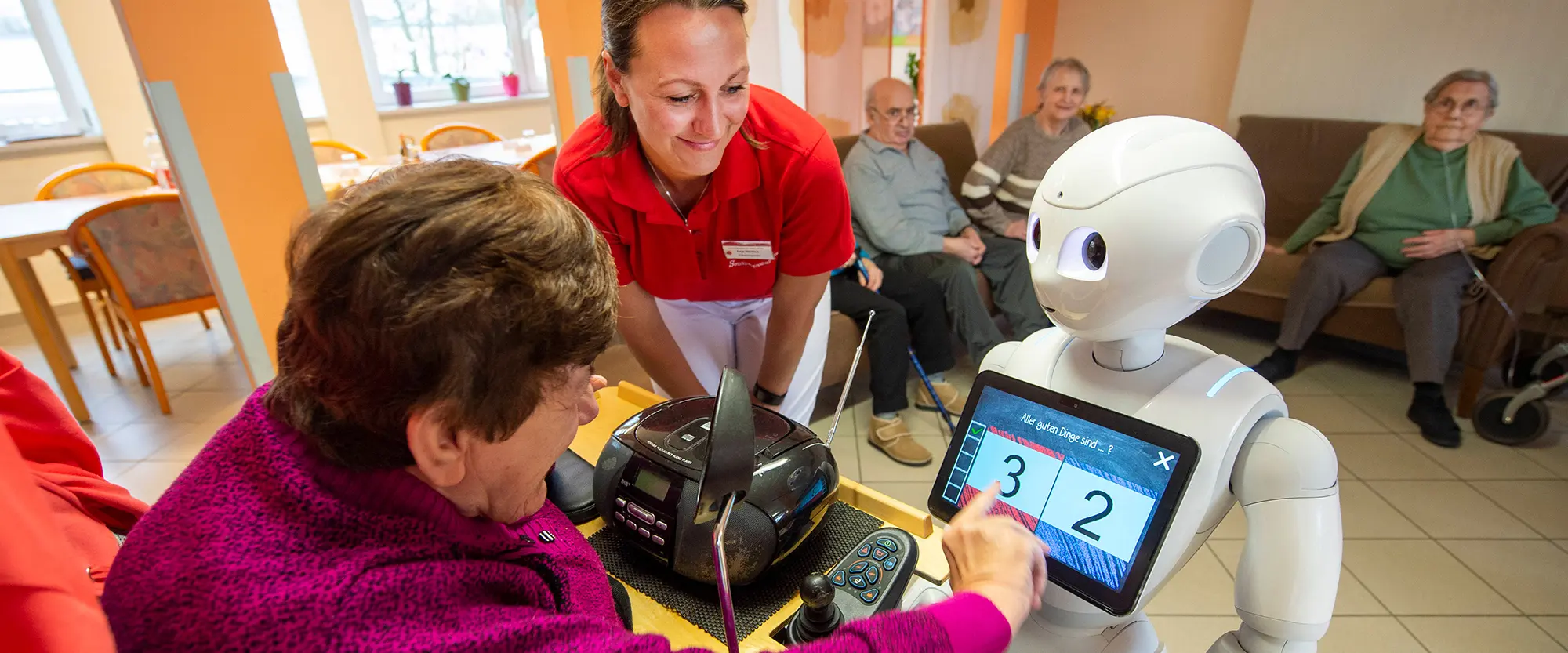Study reveals great potential for social robots in Switzerland
The study “Social robots, empathy and emotions” provides a comprehensive overview of the risks and opportunities presented by social robots for Switzerland and also contains recommendations for society, politics and the economy. The University of Applied Sciences and Arts Northwestern Switzerland (FHNW), the Zurich University of Applied Sciences (ZHAW) and the University of St.Gallen collaborated on the TA-SWISS-commissioned study.
The two-year interdisciplinary study explored the possible consequences of interaction between humans and social robots. It also examined the ethical and legal implications associated with the use of social robots. The researchers adopted various perspectives in shedding light on four areas of application, namely “health”, “public spaces”, “private households” and “education”.
Social robots show potential, assistive role preferred
The results now available clearly demonstrate that there is a wide range of potential uses for social robots across all areas of application. They can, for example, promote the autonomy of people requiring care, enhance customer shopping experiences and lend support during learning processes for children, young people and adults. While humanoid or animaloid robots facilitate intuitive interaction, they also carry the risk of deception. This is especially true for robots that are designed to mimic humans very closely in terms of their appearance and the way they interact.
The study also reveals that users would prefer to see social robots used in roles that offer assistance and support. This would enable team members to decide which responsibilities should be assigned to the robots, opening up new possibilities for interaction with their target groups. The study identified the poor embedding of robots in social settings and the associated reduction in human-to-human interaction as a primary risk.
Involving society
Specific recommendations for society, politics and the economy were derived on the basis of the team's findings. The researchers consider the participatory development of usage scenarios and task profiles to be key. This is particularly true in the case of vulnerable end-users in the health care and education sectors. The study therefore proposes that further research and development be conducted specifically in this area, for example through the scientific monitoring of pilot projects.
It is also recommended that society's involvement in determining the areas in which social robots are used be encouraged. Prospective users should be educated and informed about how social robots work and how they are being developed. As with other technologies, it is essential to ensure that people's privacy and intimacy are protected. The researchers believe that the provision of prior consent to the use of social robots represents a viable path here.

Source: University of Applied Sciences and Arts Northwestern Switzerland (FHNW)
The FHNW School of Business, the FHNW School of Education, the Zurich University of Applied Sciences (ZHAW) (School of Health Professions) and the University of St.Gallen all participated in the project led by the FHNW School of Business. The project involved literary research, interviews with experts and round tables with representatives from each area of application.
The final report, which is now available, provides a broad overview of the risks and opportunities presented by social robots for Switzerland and contains robust findings and recommendations. It provides a systematic introduction to the topic for those who work with, or plan to work with, social robots in any way.
Moder Information
- Prof. Hartmut Schulze (project manager)
FHNW School of Applied Psychology
Phone +41 62 957 24 19, hartmut.schulze@fhnw.ch - Prof. Oliver Bendel (deputy project manager)
FHNW School of Business
Phone +41 56 202 73 16, oliver.bendel@fhnw.ch - Prof. Maria Schubert (deputy project manager)
Zurich University of Applied Sciences (ZHAW)
School of Health Professions
Phone +41 58 934 6503, maria.schubert@zhaw.ch
Contact
Doris Scholl
University of Applied Sciences and Arts Northwestern Switzerland (FHNW)
School of Applied Psychology
Communication and Marketing
Riggenbachstrasse 16
4600 Olten
Phone +41 62 957 28 02
doris.scholl@fhnw.ch

